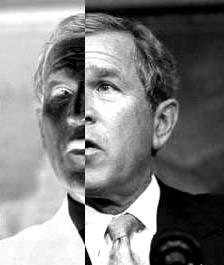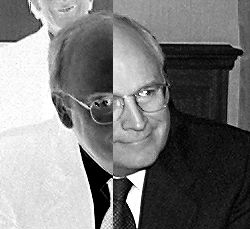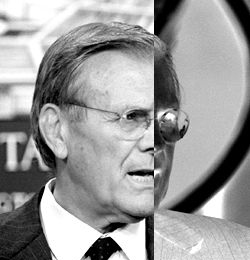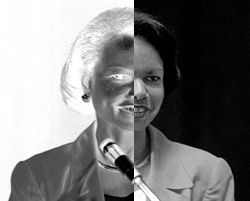|
Responses to Bush/Blair Evidence : Rep. Henry Waxman Voted for War, Now Questions Bush Lies : The Status of Nuclear Inspections in Iraq: An Update, IAEA : Claims and Evaluations of Iraq's Proscribed Weapons by Dr Glen Rangwala : Evaluation of the Blair Dossier by Zaid Al-Ali : Review of Iraqi Nuclear Capabilities, LRB : A First Response to Powell's UN Presentation, by Dr. Glen Rangwala : Lying Us Into War, Take Back the Media : Rules of Engagement, Amnesty Other Solutions : Suicide From Fear of Death?, NYT : Why Saddam is Deterrable, Foreign Policy : Questions about the War by Rep. Ron Paul : Iraq: An Alternative to War, Newsday : Iraq: A History of Deterrence, High Clearing : Military Brass Favors Containment, WP : With Weapons of the Will, Sojourners : The Case of Romania in 1989, MMR High-Ranking Opposition to the Rush to War : City Council Resolutions Against A War : Bipartisan Group of Former US Senators : Veteran Intelligence Professionals for Sanity : The Cordesman Memo, CounterPunch : Diplomat John Kiesling's Resignation Letter : Diplomat John H. Brown Resigns : Diplomat Mary Wright's Resignation Letter : Missouri GOP Chairman's Resignation Letter : NSC Official Rand Beer Resigns : Retired Gen. Norman Schwarzkopf : Retired Marine Gen. Anthony Zinni : Retired Gen. Merrill A. McPeak : FBI Special Agent Coleen Rowley's Letter : Defeat Al-Qaeda First by Ken Pollack
The Road to War : The Thirty-Year Plan for the Middle East, Mother Jones : The War Lobby and the Disciples of NSC-68, Online Journal : Project for the New American Century : Iraq Wars, Z-Net : Plans For Iraq Attack Began On 9/11, CBS : How Long has War Been in the Cards?, FT
Rumsfeld's Notes On 9/11 Notes taken by aides who were with Rumsfeld in the National Military Command Center on 9/11 show that Rumsfeld was planning on using 9/11 as a pretext to attack Iraq from the very beginning. There is to date very little evidence that Iraq was connected to 9/11.
Arguments for Deterrence In a January/February 2000 article in Foreign Affairs, Condoleezza Rice wrote, that regimes like Iraq "are living on borrowed time, so there need be no sense of panic about them. Rather, the first line of defense should be a clear and classical statement of deterrence — if they do acquire WMD, their weapons will be unusable because any attempt to use them will bring national obliteration. Second, we should accelerate efforts to defend against these weapons. This is the most important reason to deploy national and theater missile defenses as soon as possible, to focus attention on U.S. homeland defenses against chemical and biological agents, and to expand intelligence capabilities against terrorism of all kinds."
|
LIES | THRIVES | ACT | CONTACT
..:: Lies about Iraqi nuclear capabilities The State Department's December, 2002 fact sheet claimed that Iraq had omitted efforts to procure uranium from Niger in its UN weapons declaration. In his January, 2003 State of the Union speech, Bush repeated the claim that "Saddam Hussein recently sought significant quantities of uranium from Africa." UN weapons inspectors have exposed the documents on which this claim was based to be crude forgeries. One letter has Niger's president citing Niger's 1965 constitution, but that constitution has been defunct for four years. Another letter dated October, 2000 purports to be signed by a Mr. Alle Elhadj Habibou, but Alle Elhadj Habibou has not been foreign minister since 1989. The same letter misstates the name of the government as the "Supreme Military Council," the name of the pre-1999 government. The US and Britain did not offer any further evidence to support the claim that Iraq attempted to purchase uranium from Niger, and the CIA has said it has been skeptical of the link all along. It is still unclear how and why the forged documents acquired credibility with the US and Britain. In a September, 2002 news conference, Bush cited an IAEA document as evidence that Iraq in 1998 was "six months away" from developing a nuclear weapon. When confronted with the falsity of this statement, the White House claimed Bush was referring to an earlier, 1991 IAEA report. In the same conference, Bush claimed that a satellite photograph showed suspicious construction in Iraq. The International Atomic Energy Agency says that neither of the reports cited by Bush in fact exist. Mark Gwozdecky, the IAEA's chief spokesman, said, "There's never been a report like that issued from this agency." On the contrary, the IAEA's 1998 report stated, "There are no indications that there remains in Iraq any physical capability for the production of weapon-usable nuclear material of any practical significance." Gwozdecky disputed Bush’s assessment about the satellite photograh, saying that there was no specific photo or building that aroused suspicions. Bush has repeatedly claimed that Iraq was attempting to import high-strength aluminum tubes "for gas centrifuges, which are used to enrich uranium for nuclear weapons." He made this claim in his September 2002 speech to the UN General Assembly. Powell repeated this claim in his February 2003 speech to the UN Security Council, and said that high-quality tubing must be intended for centrifuges to enrich uranium. This assertion is widely disputed.A September 24, 2002 Blair government white paper stated that there was "no definitive intelligence" that the tubes were destined for a nuclear program. US and foreign officials also noted that there is no evidence to date that Iraq has sought to purchase other materials required for centrifuges, such as motors, metal caps and special magnets. The International Atomic Energy Agency told the UN Security Council that Iraqi officials had said the tubes were for making 81-mm rockets, and that this claim was credible, as the tubes were unsuited for centrifuges. Officials in the US State Department's Bureau of Intelligence and Research and gas-centrifuge specialists at the Department of Energy have also said that the tubes were meant for rockets. David Albright, a physicist and former UN weapons inspector currently at the Institute for Science and International Security, has said that the 81-millimeter tubes, with their small diameter and thick walls, were poorly designed to enrich uranium and that no one has used such machines to produce significant amounts of uranium in a cascade of such machines. were also skeptical. Corey Hinderstein, assistant director of the Institute for Science and International Security, has said that anodized tubes are not in fact appropriate for centrifuges and the anodization, which is used to prevent corrosion, would need to be removed before the tubes could be so used. Hinderson also said that European rockets had exactly the same high degree of specificity. Bush has cited evidence obtained in 1998 "from a high-ranking Iraqi nuclear engineer who had defected revealed that despite his public promises, Saddam Hussein had ordered his nuclear program to continue." The implication is that the defector, Khidhir Hamza, was speaking on the state of Iraqi nuclear capabilities in 1998, but Hamza had retired from Iraq's nuclear program by 1991 and left Iraq in 1995. His book on his role in the Iraqi nuclear program has been criticized for technical inaccuracies and claims on programs of which he had no direct knowledge. Hussein Kamel was the head of the Military Industrialization Corp., the agency which oversaw Iraq's weapons programs. In 1995, Kamel defected from Iraq. Bush, Cheney, Powell and Blair have all cited Kamel's testimony with approval. Cheney said Kamel's story "should serve as a reminder to all that we often learned more as the result of defections than we learned from the inspection regime itself". Newsweek reported that Hussein Kamel told CIA and British intelligence officers and UN inspectors that after the Gulf War, Iraq destroyed all its chemical and biological weapons stocks and delivery systems in fear of UN inspections. CIA spokesperson Bill Harlow claimed, "[The Newsweek article] is incorrect, bogus, wrong, untrue." Kamel's 1995 interview with UN inspectors was subsequently leaked. Kamel had stated, "I ordered destruction of all chemical weapons. All weapons — biological, chemical, missile, nuclear were destroyed." Another exiled Iraqi nuclear scientist, Imad Khadduri, worked on Iraq's nuclear program during the 80s, and continued to work with the nuclear program after the Gulf War, contributing to one of Iraq's last major reports for the UN inspectors. Khadduri left Iraq in 1998. He has said that Iraq's nuclear program fell into disarray after the Gulf War, and that there is no way it possesses nuclear weapons at this point. ..:: Lies about Iraqi links to Al-Qaeda The Bush administration has claimed links between al-Qaeda and Saddam. In 1998, the National Security Council reviewed all the available intelligence and found no evidence of a noteworthy relationship. In a January 21, 2003 question period, Tony Blair said, "Whenever I am asked about the linkage between al-Qaeda and Iraq, the truth is there is no information I have that directly links Iraq to September 11." A British intelligence report states that there are no current links between the Iraqi regime and the al-Qaeda network. In his February, 2002 speech to the UN Security Council, Colin Powell asserted that Islamists, by implication Ansar ul-Islam, were operating a poisons training camp and factory in Khurmal in northern Iraq. Ansar ul-Islam are reported to have connections with al-Qaeda. It is unclear if such a factory exists at Khurmal, which is not under Ansar ul-Islam's control, or exists at all. A survey of Kurdish officials found contradictory statements on the existence and location of such a factory, and a tour for journalists revealed no factory in Ansar-controlled territory. Sen. Joe Biden, among other Congresspeople, have questioned why such a factory would have been allowed to function, when US forces patrol northern Iraq. Powell also claimed that the murder of the special branch officer Stephen Oake in Manchester was linked to a leading al-Qaida terrorist harboured by Iraq. British security sources were quick to distance themselves from this claim. Security sources said there was no solid evidence to support Powell's claim. The administration has repeated accounts of terrorist operatives meeting with Iraqi intelligence officials in Prague. Investigations into a supposed Prague meeting between al-Qaeda and Iraq found that the Iraqi officer met regularly with a friend, a used car dealer, who closely resembles Atta. Inquiries also suggested that the source of the Czech information came from Prague restaurateurs trying to impugn a competitor whose establishment was used for the supposed meeting. Czech security chiefs have now concluded they made a mistake in their earlier reports of such a meeting. Vaclav Havel has said that there is no evidence that Mohamed Atta met with an Iraqi intelligence officer in Prague. In an October 7, 2002 speech in Cincinnati, Bush cited as evidence of al-Qaeda connections to Hussein "one very senior al Qaeda leader who received medical treatment in Baghdad this year." US intelligence officials acknowledge that there is no evidence that the terrorist, Abu Musab Zarqawi, was in contact with Hussein's government or that Hussein knew he was there. In the same speech, Bush said that "Iraq could decide on any given day to provide a biological or chemical weapon to a terrorist group or individual terrorists." CIA analysts, in testimony to Congress, said it was unlikely that Hussein would initiate a chemical or biological weapons attack against the US but might take the "extreme step" of assisting terrorists if provoked by a US attack on Iraq. Government sources have said that al-Qaeda affiliates may have come into possession of the deadly chemical weapon VX while in Iraq. Rumsfeld said, rather vaguely, "I have seen other information over a period of time that suggests that could be happening." Counterterror and defense officials have said that there is no credible evidence that Iraq supplied the nerve agent to al-Qaeda operatives. In August, Rumsfeld told Tom Brokaw on NBC News that "there are al-Qaeda in Iraq." Rumsfeld, as well as Condoleeza Rice, have alleged that some al-Qaeda members may be in Baghdad, and that they may even have received training in chemical weapons technologies from Iraqi agents. Deputy Secretary of State Richard Armitage and the intelligence analysts both restated their convictions that any al-Qaeda operatives inside Iraq were in the northern part of the country, beyond Saddam's control. Rumsfeld has admitted that the claim about al-Qaeda in Baghdad was only a provisional intelligence finding based on a single source, and offered no further details about the nature of the alleged complicity. US intelligence sources have said al-Qaeda members are believed to be simply moving through Iraq en route to their home countries. ..:: Lies about Iraqi Delivery Systems The Bush administration has contended that Iraq possesses missiles that are a threat to US national security. The CIA's technology assessment states that Iraq has no missile deployed that could hit the United States proper, and it could only develop such a missile if UN sanctions were lifted completely. In a October, 2002 speech, Bush said, "Iraq possesses ballistic missiles with a likely range of hundreds of miles — far enough to strike Saudi Arabia, Israel, Turkey and other nations — in a region where more than 135,000 American civilians and service members live and work." In a 6 March, 2003 news conference, Bush dismissed Iraq's destruction of its Al Samoud-2 missiles, saying they were being dismantled "even as [Hussein] has ordered the continued production of the very same type of missiles." A senior intelligence analyst has said that there were electronic intercepts that had individuals talking about being able to build missiles in the future, but no evidence that Hussein had ordered continued production. The Al Samoud-2 missiles can travel less than 200 miles, which is not far enough to hit the targets Bush named. Defense officials say Iraq has few, if any, operational long-range missiles that could be used to attack Israel or other US allies in the region, much less the US. US intelligence estimates that Iraq has perhaps two dozen Scud "B" missiles with a range of 400 miles, but that they are not assembled. Bush has asserted that Iraq is "exploring ways" of using drone aircraft to disperse chemical or biological agents against targets in the United States. This claim has been widely challenged. UN reports confirm that Iraq has converted Czech-made L-29 trainer jets into unmanned aircraft and that it has sought to equip them with sprayers, but such planes are incapable of flying long distances. Colin Powell has said Iraqi drones could be fitted to dispense chemical and biological weapons. While Iraq has lied about the specifications of these drones, journalists who have seen them say they appear to be made of balsa wood and duct tape, and are too flimsy to be used as delivery systems for chemical or biowarfare. ..:: Exaggerations about Iraqi Chemical and Biological Weapons Colin Powell claimed that UN weapons inspectors had found that Iraqi officials were hiding and moving illicit materials within and outside of Iraq to prevent their discovery. In his February, 2003 speech to the UN Security Council, Powell also claimed that Iraq has mobile biological weapons laboratories which it moves ahead of an inspection. Hans Blix, chief weapons inspector, has said that he has found no evidence of mobile biological weapons laboratories or of Iraq trying to foil inspectors by moving equipment before his teams arrived. He has also said that he has not seen convincing evidence that Iraq has been sending weapons scientists to other countries to prevent them from being interviewed. Colin Powell claimed that the mobile labs were often on a 24-hour production cycle to elude weapons inspectors. Raymond Zilinskas, a microbiologist and former UN weapons inspector, said that a 24-hour production cycle was insufficient for creating significant amounts of pathogens such as anthrax, and 36 to 48 hours were required just for the fermentation. Zilinskas and other experts said Powell's schematic for the labs was theoretically plausible but highly unlikely. The Bush administration has cited Iraqi purchase of large quantities of a nerve gas antidote and insinuated that this is evidence of Iraqi plans to use chemical weapons. The Bush administration then twice threatened to block a renewal of Iraq's oil-for-food programme unless action was taken to stop Iraq from acquiring atropine. The drug atropine is used to treat heart and respiratory disorders, and is also used, in massive dosages, for organophospate (pesticide) poisoning. There has been no public confirmation of the new atropine order from independent sources, but the size of the order is significantly smaller than would be appropriate for military uses, and Iraq has previously bought comparable and even larger quantities of atropine with Security Council approval. Atropine is not on the Security Council's list of suspicious goods, which was developed with US oversight. ..:: Lies about Saddam's Non-Cooperation with UN Inspectors Rumsfeld said that Saddam kicked UN inspectors out of Iraq in December, 1998. The inspectors withdrew at the direction of Richard Butler, head of the UN weapons inspection team in Iraq. Butler, who team was riddled with US spies, had just published a report, written in consultation with US officials, accusing Iraq of obstructing UN weapons inspections. In response to the report, President Clinton announced that he would launch military attacks against Iraq. Butler evacuated his inspectors to safety in anticipation of Clinton's airstrikes. It is also important to note that UN inspectors' reports of missing inventory is in fact a gap between what UN estimates Iraq has, and what Iraq has admitted or been shown to have. It is not possible to perfectly assess how much Iraqi weaponry was destroyed by the massive bombing in the first Gulf War. ..:: Non-Cooperation with the UN CIA director George Tenet told a Senate panel that contrary to his previous statements, there were in fact "a handful" of locations the UN inspectors may not have known about. In February, 2003, Senator Carl Levin, citing classified letters he had obtained from the CIA, said it was clear the CIA had not shared information with the inspectors about a "large number of sites of significant value." UN arms inspectors have complained about the quality of US intelligence and charged the US with sending them on wild-goose chases. The US supplied satellite photographs purporting to show new research buildings at Iraqi nuclear sites, and coordinates at Saddam's presidential palaces which supposedly held incriminating evidence, but when UN inspectors investigated, they found nothing. The inspectors described themselves as caught between the duplicitous Iraqi regime, and the Bush administration, whose intelligence they've found to be circumstantial, outdated or just plain wrong. The US edited out more than 8000 pages of the UN's only complete copy of Iraq's 11,800-page dossier on weapons, before passing on a sanitised version to the 10 non-permanent members of the United Nations Security Council. The other permanent members of the Security Council did have access to the complete dossier, and agreed to the US editing on the grounds of weapons non-proliferation. The US has also used covert operations to monitor and influence the non-permanent members's votes. In November, 2002, while the UN inspection process was going on, British and American warplanes were attacking Iraq's air defences almost daily, and making practice runs on other targets. US special forces were reported to be on the ground in western and northern Iraq, and military engineers are preparing and upgrading airfields in the Kurdish zone. The Bush administration has tried to pressure international agencies with oversight on weapons of mass destruction. The Pentagon had the CIA investigate Hans Blix, the chief weapons inspector, to find something to undermine his credibility, and was unhappy when the CIA came up empty-handed. The US forced the departure of Jose Bustani, head of the Organisation for the Prohibition of Chemical Weapons, who was working for Iraq to join the Chemical Weapons Convention and destroy its chemical weapons stores. ..:: politicizing intelligence gathering Intelligence professionals continue to express misgivings about the Bush administration's refusal to hear news that does not fit with administration policies. CIA and the Defense Intelligence Agency analysts warned of the likelihood of vigorous fighting from Iraqi soldiers and the use of guerilla tactics, but they say that these warnings were toned down as reports were taken to Bush administration policymakers. Military officers, intelligence analysts and diplomats have been expressing their misgivings before the war started: intelligence sources have said that "intelligence is obviously being politicized," and that senior administration officials are pressuring CIA analysts intelligence analysts to produce reports justifying a pre-emptive military strike against Iraq. The LA Times writes, "In what sources described as an escalating 'war,' top officials at the Pentagon and elsewhere have bombarded CIA analysts with criticism and calls for revisions on such key questions as whether Iraq has ties to the Al Qaeda terrorist network, sources said... Analysts are increasingly resentful of what they perceive as efforts to contaminate the intelligence process. 'Analysts feel more politicized and more pushed than many of them can ever remember,' said an intelligence official, speaking on condition of anonymity... Evidence of the differences between the agency and the White House surfaced publicly this week when CIA Director George J. Tenet sent a letter to lawmakers saying the Iraqi president is unlikely to strike the United States unless provoked." Vincent Cannistraro, the CIA's former head of counter-intelligence, says, "Basically, cooked information is working its way into high-level pronouncements and there's a lot of unhappiness about it in intelligence, especially among analysts at the CIA." MI6 and other British intelligence agencies have also complained that the Blair government has been pushing them to exaggerate the evidence on on Iraq. The Blair government has resorted to a dossier of plagiarized material, including a paper relating to the build-up to the 1991 Gulf War by Ibrahim al-Marashi which was rewritten to exaggerate its findings. ..:: Overstating Saddam's Rapacity The Pentagon has stated that when Iraqi soldiers captured by Iran during the Iran-Iraq war returned home, Saddam Hussein ordered their ears cut off. Human rights monitors have said that while deserters did suffer this treatment, they did not know of evidence that Iraqi POWs had been treated this way, and they expressed surprised that Bush would exaggerate when there is so much real evidence of Saddam's rapacity. Blair claimed that an "increasing" number of Iraqi exiles had been writing to him directly to describe Saddam's atrocities. Of the four exiles whose names he released, two were discovered to have ties to the Iraqi opposition and to the US State Department: Dr Adil Awadh of the Iraqi National Accord, and Munther Alfadhal, a member of a US State Department working group on Iraq who is said to have drafted a replacement constitution. Amnesty International has criticized the Blair government's use of Amnesty reports in the Blair Dossier, saying "Selective and opportunistic attention to human rights serves only to undermine international human rights standards." ..:: overstating the certainty that saddam attempted to assassinate Bush Sr Bush has said that Saddam Hussein is "the guy who tried to kill my father." Seymour Hersh has shown that there are only tenuous connections between Saddam and the alleged assassination attempt on George Bush Sr. A Justice Department official, Mark Richard, said "that the final determination of Iraqi complicity in the alleged assassination attempt was a result of 'process' — the careful analysis of possible scenarios — and did not stem from any specific information." |






